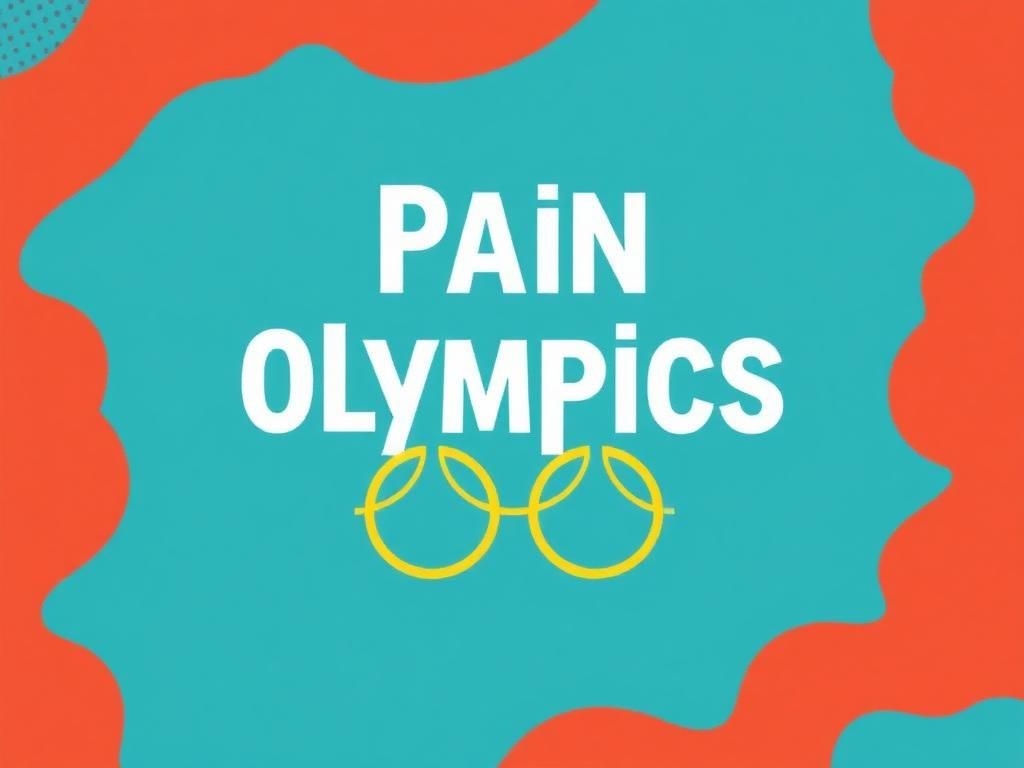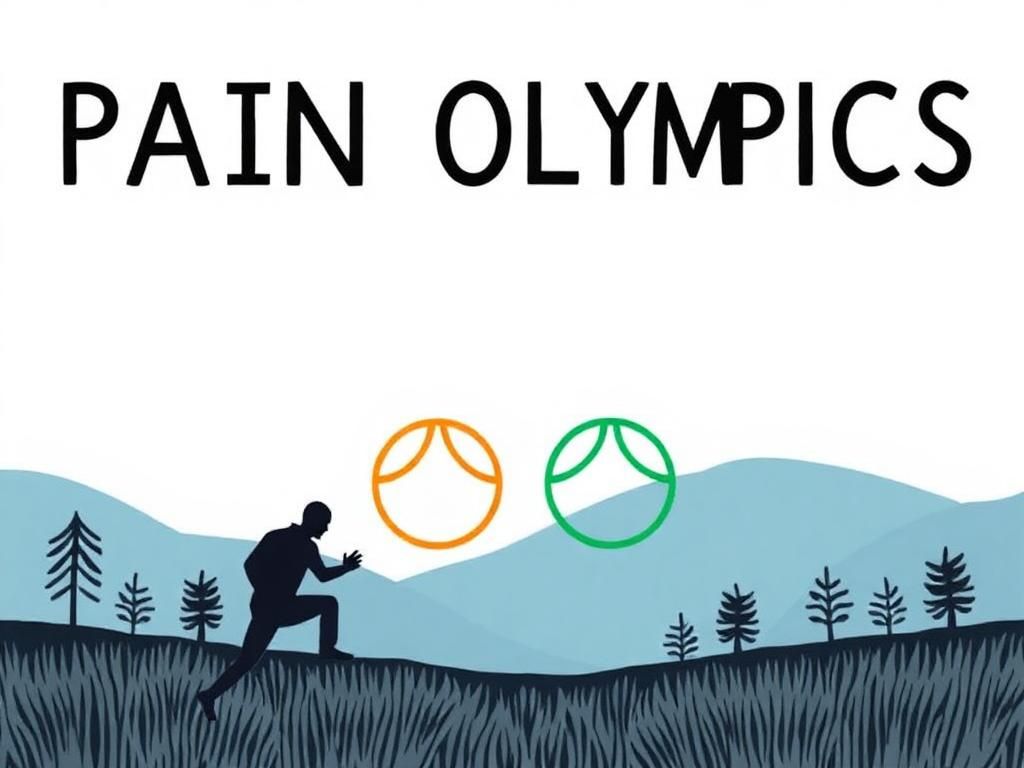The term Pain Olympics has emerged as a provocative concept in contemporary discourse, symbolizing the comparison of pain and suffering among individuals. This phenomenon has found its footing particularly on social media platforms, where users often recount their hardships in a competitive light. In doing so, the Pain Olympics can diminish the authentic experiences of individuals, creating a culture that prioritizes competition over compassion and understanding.
Understanding the cultural relevance of the Pain Olympics is essential for fostering a more empathetic society. As we delve deeper into the history, psychological aspects, and social media manifestations of pain comparison, it becomes evident that discussing the Pain Olympics is crucial in shaping a compassionate dialogue surrounding human suffering.
Understanding the Concept of Pain Olympics
Origin and Evolution
The Pain Olympics originated as a social commentary on how society often ranks suffering. The term gained traction in forums and social media where individuals voice their grievances, sometimes in exaggerated forms. Initial references can seemingly be traced back to discussions surrounding mental health awareness and chronic illness, where individuals began to share their experiences. Over time, this sharing sometimes morphed into competitive narratives, leading to the evolution of the Pain Olympics phenomenon.
The Psychological Aspect
At its core, the Pain Olympics reflects an interesting blending of empathy and competition. People may feel compelled to share their struggles to garner sympathy, driving a psychological need for validation. This phenomenon raises critical questions about the motivations behind comparing pain. While sharing experiences can foster empathy, it often leads to unhealthy competition regarding who has suffered more. Such competition can create a distorted narrative around suffering, negating the experiences of those who may feel that their pain is less valid.
Pain Olympics in Social Media
Platforms Involved
Social media platforms like Twitter, Reddit, and TikTok play significant roles in propagating the concept of the Pain Olympics. On these platforms, posts showcasing personal struggles often go viral, with users vying for acknowledgment and resonance. Examples abound, from threads where users share their hardest experiences to TikToks that humorously poke fun at Pain Olympics culture, highlighting the absurdity of competing over suffering.

The Role of Memes and Humor
Memes have become a crucial vehicle for the dissemination of the Pain Olympics concept. Through humor, users can relate to one another while simultaneously trivializing their experiences and those of others. This delicate balance can be problematic, as it often perpetuates an environment where pain is downplayed. Yet, it is through these memes that discussions about pain can sometimes become more accessible, inviting reflection and dialogue, albeit with inherent risks.
Influencers and Notable Comments
Several social media influencers and public figures have engaged in conversations surrounding the Pain Olympics, sometimes unintentionally fueling the competition. Their statements can resonate widely, determining societal norms about how pain should be perceived. When public figures compare their hardships, it can validate the narrative that suffering must always be measured against another’s pain, complicating personal experiences and overshadowing individualized perspectives on pain.
Impact on Society and Relationships
Personal Relationships
The impact of the Pain Olympics on personal relationships can be profound. Friends and family may find themselves in situations where their expressions of suffering are met with competition rather than understanding. This dynamic can create misunderstandings and resentment, potentially fraying bonds that should foster support and empathy. It is crucial to mitigate these effects by encouraging open dialogues that center on validation rather than comparison.
Healthcare and Patient Advocacy
The intersection of the Pain Olympics with chronic pain communities is particularly noteworthy. For patients with chronic conditions, the competition over pain levels can lead to feelings of invalidation from healthcare providers. This unintentional marginalization can hinder the quest for effective pain management and appropriate support systems. Thus, it becomes pivotal for patient advocates to educate healthcare professionals on recognizing diverse experiences of pain without engaging in competition.
Mental Health Implications
Comparing pain can have severe ramifications for mental well-being. Those who feel that their struggles are trivialized may find their mental health declining. Strategies to mitigate these negative impacts might involve promoting narratives of collective suffering without comparison, fostering environments where pain can be shared and validated through understanding rather than competition.
Critiques of the Pain Olympics Phenomenon
The Problem of Invalidating Suffering
One major critique of the Pain Olympics lies in its potential to invalidate individual suffering. When people compare different types of pain, it can perpetuate a culture where only certain experiences are deemed worthy of acknowledgment. Numerous anecdotes illustrate these dynamics, showcasing instances where personal experiences are overshadowed by more publicized hardships, resulting in feelings of inadequacy and isolation.
Societal Pressures and Competitiveness
The pressures of societal expectations contribute significantly to the Pain Olympics. In cultures that prize resilience and strength, expressing vulnerability through personal pain can seem like a weakness. This can lead individuals to compete regarding their suffering, affecting their identity and complicating their societal roles. Recognizing these pressures is essential for creating a supportive culture that values shared experiences of pain without the need for competition.
Encouraging Healthy Discussions Around Pain
Developing Empathy and Understanding
To foster a healthier dialogue about pain, developing techniques that prioritize empathy over competition is vital. Techniques such as active listening, shared storytelling, and encouraging vulnerability can build supportive environments. By focusing on understanding rather than comparison, individuals can feel more connected and validated in their experiences, paving the way for richer discussions about suffering.
Resource Sharing and Support Systems
The importance of creating supportive spaces for discussing pain cannot be overstated. By sharing resources—such as pain management strategies, mental health support, and community forums—individuals can cultivate environments that prioritize collective healing over competition. Various mental health organizations provide valuable resources to help manage pain and improve well-being, guiding people on their journeys without comparative judgment.
Conclusion
The implications of the Pain Olympics in modern society extend far beyond individual experiences. By understanding its origins, social manifestations, and societal impacts, we can begin to navigate the complex landscape surrounding pain and suffering. Encouraging empathy while providing support will ultimately foster healthier discussions about suffering, validation, and the authentic sharing of experiences.
FAQ
- What is the Pain Olympics? The Pain Olympics is a term used to describe the competitive comparison of suffering and pain between individuals.
- How did the term Pain Olympics originate? The term gained popularity through social media, where users began sharing their hardships in competitive contexts.
- How does the Pain Olympics affect personal relationships? It can create misunderstandings and resentment, as individuals may feel their pain is being minimized in comparisons.
- What role do social media platforms play in Pain Olympics? Platforms like Twitter and TikTok amplify the sharing of personal stories and foster competitive narratives about pain.
- Are there mental health implications associated with the Pain Olympics? Yes, comparing pain can affect mental well-being, leading to feelings of inadequacy and isolation.
- How can we foster healthier discussions about pain? Techniques that promote empathy, active listening, and resource sharing can build supportive discussions about pain experiences.
- What criticisms exist about the Pain Olympics? Critics argue that comparing pain invalidates individual experiences and perpetuates competitive suffering narratives.
- How can health care providers address the Pain Olympics? They should recognize the diverse experiences of pain and avoid engaging in comparison during patient interactions.
- What strategies can mitigate the negative impacts of Pain Olympics? Fostering conversations that prioritize understanding and validation over competition can reduce negative impacts.
- Where can I find resources on pain management? Various mental health organizations and chronic pain communities offer valuable resources for pain management and support.
References
| Key Points on Pain Olympics | Description |
|---|---|
| Definition | A competitive comparison of suffering among individuals. |
| Origins | Arose on social media, particularly in mental health discussions. |
| Impact on Relationships | Can create misunderstandings and resentment among friends and family. |
| Mental Health Effects | Can lead to feelings of inadequacy and depression. |
| Critiques | May invalidate personal suffering and promote unhealthy competition. |
| Positive Approaches | Encourage empathy, validation, and resource sharing. |


